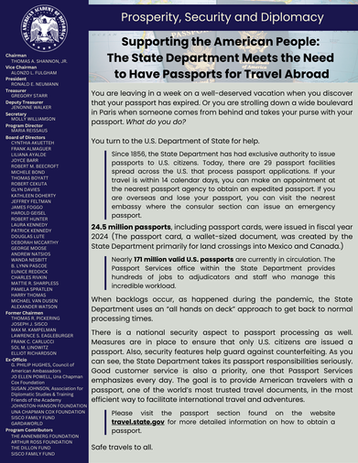The State Department’s current risk aversion at higher-threat posts obstructs the performance of the most basic functions of a diplomat. Effective diplomacy to meet national interests requires a method to engage more broadly even in high-threat locations. The Academy’s new report suggests several changes to address the growing level of risk intolerance experienced in U.S. missions abroad.
The report offers three ways to change the risk paradigm for U.S. diplomats:
Change the language and structure of the Accountability Review Board (ARB),
Identify best practices and new techniques for operating in high-threat locations,
Change a culture of risk aversion that has developed over the years.
Working only by telephone or an occasional meeting inside secure walls is not a substitute for developing the continuing contacts necessary with local officials and populations. In short, the formulation and execution of national security policy is hindered by the lack of access to foreign contacts at higher-threat missions.
Several former ambassadors, generals, and other senior Foreign Service officials have voiced support for the Academy’s report, including General John Allen, Ambassador Ryan Crocker, and Ambassador Anne Patterson.
Diplomats are not soldiers. Lowering and mitigating risk is important. But when it becomes the top priority then diplomats can no longer carry forward the nation’s interests.
The Honorable Greg Starr,
former Assistant Secretary of State for Diplomatic Security
The Accountability Review Board mechanism became a standing threat to find someone to blame for a security incident. This is paralyzing essential diplomatic operations in high threat areas and leaving America open to deadly surprises.
Ambassador (ret.) Ronald E. Neumann







